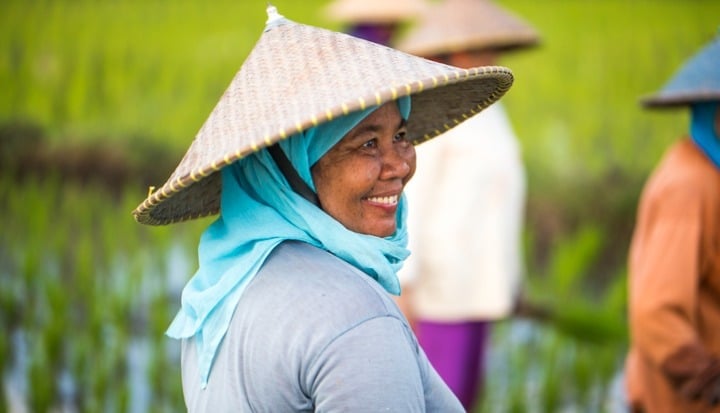Last year, Mars’ Farmer Income Lab estimated that up to 70% of the smallholder farmers in agri-food supply chains – more than 122 million people – may be living below the global poverty line of $3.20 per day. Mars, like any agri-business, relies on the work of these farmers around the world who produce the ingredients that go into our products, such as cocoa, rice and mint. This is why eradicating poverty in supply chains is a significant challenge that must be urgently addressed.
At Mars, our ambition is for smallholder farming families to earn sufficient income to maintain a decent standard of living. This level of income is called a “living income.”
A living income enables farmers not only to escape poverty, but also to experience a decent quality of life. Earning a living income means farmers can provide basic needs for their families, from sufficient food and water, clothing and housing to education, healthcare, and transport. A living income also should include the ability to save, so that unforeseen expenses do not force farmers back into poverty and debt. Ideally, a living income should enable farmers to continue to invest in, and grow, not only their farms, but also their livelihoods.
Unfortunately, all too often, ‘business as usual’ fails to deliver value for smallholder farmers. To create systemic change, we must transform the way we source raw materials.
Procurement teams are at the heart of this transformation. For too long business has bought raw materials on the commodity market where the focus is price and quality. Social and environmental impacts are not reflected in commodity prices and are instead a cost paid by the communities where commodities are sourced. In some instances, such as with climate change, impacts from sourcing decisions can even be felt globally. These externalities create a world of vast inequality and deepen farmers’ vulnerability to the climate crisis. It’s time to disrupt commodities and make the case for ‘business unusual.’
This is not a ‘nice-to-do’ agenda. It’s critical to the future success of our businesses. We are, after all, only as strong as the weakest links in our value chains. The weak link for agri-businesses is the increasingly vulnerable smallholder farmer with no ability to overcome shocks such as extreme weather events, economic downturns, and even a global pandemic.
Mars is rethinking how we procure goods and services by taking action to transform our supply chains into systems that significantly increase smallholder farmer incomes to support a decent standard of living and more resilient farming enterprises.
As Barry Parkin, our Chief Procurement and Sustainability Officer at Mars, recently said: “You can’t put a Band-Aid on a supply chain that doesn’t work for all the participants. And so, you’ve got to reimagine it, you’ve got to redesign it. And that’s the job of procurement.”
Mars is taking three immediate actions that we believe will accelerate the transition to more resilient supply chains.
First, and arguably most important, we’ve integrated our sustainability and procurement teams with a Chief Sustainability Officer who also serves as our Chief Procurement Officer. This integration is critical to driving social and environmental sustainability into our sourcing strategies at scale.
Second, we’re asking questions and working in partnership with others to understand what works to improve smallholder farmer incomes. We’re also seeking to clarify the roles of business, government and multilateral organizations, and determining who acts to drive those improvements at scale. And we’re exploring the compounding impacts of critical factors such as the COVID-19 pandemic and the escalating climate crisis in deepening human vulnerabilities to poverty.
Through the Farmer Income Lab, we are conducting research and using insights from that research to shape new sourcing strategies across our global supply chains. These innovative strategies are focused on testing different procurement practices and partnership models to point us towards interventions that can drive positive impact at scale.
A transformation of this magnitude requires a shift in mindset away from short-term contracts based on the lowest price, and towards long-term relationships and investment in farmers that will benefit all involved.
That brings me to the third area of our focus. We’re changing the rules of the procurement game by:
- Committing to longer-term contracts and more mutually beneficial trading terms, such as guaranteed minimum prices and faster payments;
- Paying premiums through quality or standard-related programs;
- Leveraging affordable finance and incentivizing investment; and
- Supporting supplier resilience with targeted investments during COVID-19, .[1]
In tandem with these strategies, multinational buyers need to align organizational incentives to this new approach. Traditionally, procurement teams are rewarded on cost savings and supply chain efficiencies. In a transformed system, incentives for procurement teams and executive leadership are reflective of the company’s sustainability objectives, including targets to achieve living incomes for smallholder farmers.
It’s important to note this transformation is about a change in approach, not inherent sacrifice. I believe this approach may actually help buyers achieve their existing business priorities. Justin White, Manager, Human Rights & Gender Equality at Mars, suggests, “Buyers who have the skills and incentives to shift small-scale farmer poverty from an externality to a strategic priority can be better positioned.”
The COVID-19 pandemic has reversed global progress to address poverty. This is and will have a knock-on effect with many other critical human rights issues. Procurement teams have an opportunity to be the heroes in accelerating progress by rethinking our conventional tactics. Through transforming the way we procure agricultural raw materials, we can enable living incomes for the millions of farmers across our global supply chains.
[1] More information on how companies can leverage procurement to increase farmer income can be found in Farmer Income Lab’s report, Poverty and Procurement through a Pandemic.










